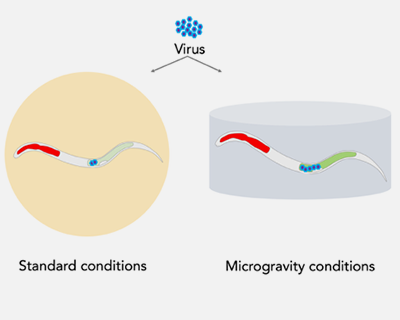SpaceWorms
Research group: Evolutionary Systems Virology
Therefore, future long-term space missions will need to consider the potential effects of microgravity on the course of possible infections affecting the astronauts, as well as the extent in which the associated changes in host physiology might impact the pathogen evolution and virulence.
In this proposal we suggest to use the nematode Caenorhabditis elegans, an organism already being used in space research, as a host to study the effects that microgravity may have in the progression of viral infections. C. elegans is a millimetric nematode with a short lifecycle with most of their genes having homologs with human genes, which makes it an ideal system to study pathogenesis as the results can be extrapolated to humans or other animal hosts. The discovery of the first virus naturally infecting C. elegans (Orsay nodavirus, OrV) has made the nematode an emergent model in the study of virus infection and immunity. It is known that simulated microgravity (SMG) induces intestinal damage in C. elegans and that OrV replicates in the intestinal cells of the nematode. Therefore, it seems conceivable that microgravity will have an effect on the progression of OrV infection. This would have relevant consequences on the virus pathogenesis, conditioning infection outcomes and virulence evolution.
Santiago Elena (CSIC, I2SysBio)















